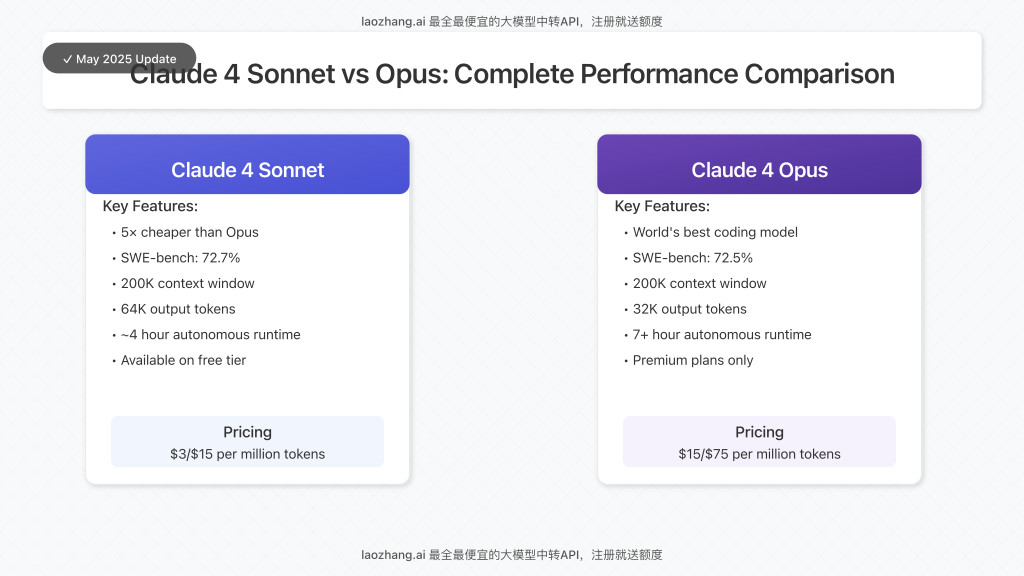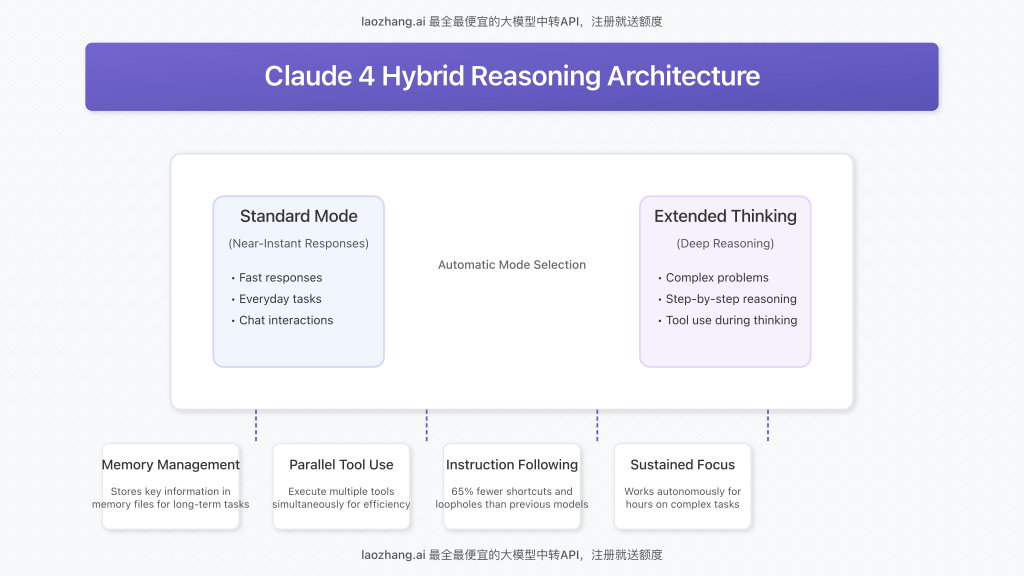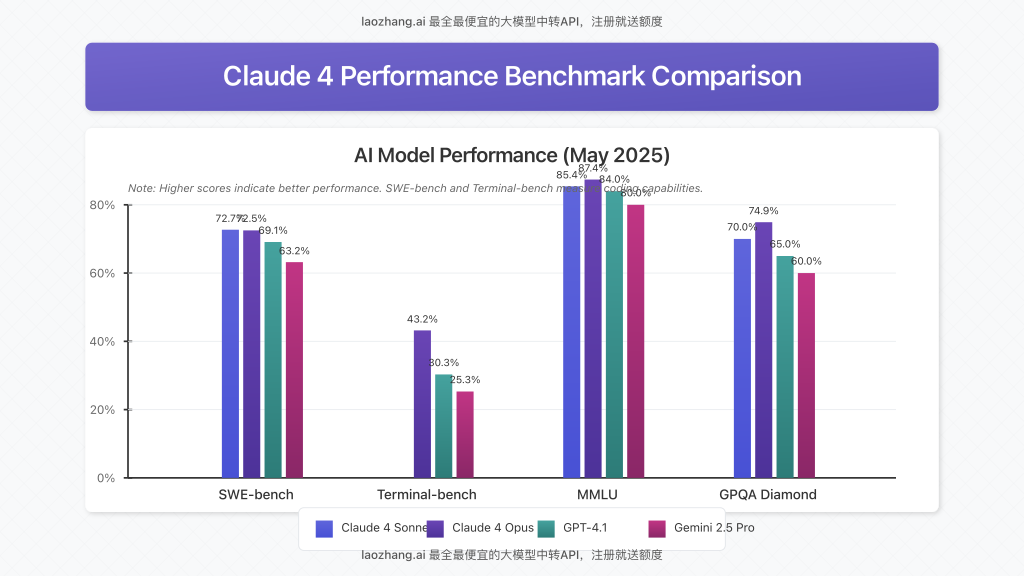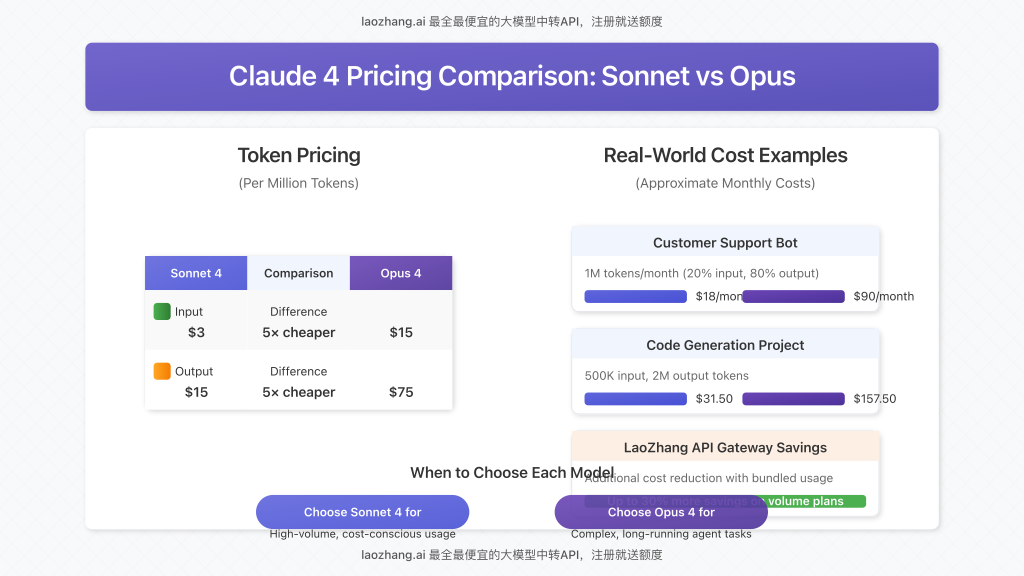✅ Updated May 2025 – Latest Claude 4 Analysis

Anthropic released Claude 4 Sonnet and Claude 4 Opus on May 22, 2025, marking a significant leap in AI model capabilities. Both models introduce hybrid reasoning, extended thinking modes, and record-breaking performance on coding benchmarks. With substantial improvements over previous versions, choosing between these powerful models depends on your specific needs and budget constraints.
This comprehensive guide analyzes the key differences between Claude 4 Sonnet and Opus, including pricing structures, performance benchmarks, and real-world applications. Whether you’re a developer, researcher, or business decision-maker, this comparison will help you select the right model for your use case.
🔥 Key Findings
- Claude 4 Sonnet: 5× cheaper than Opus while matching its SWE-bench performance (72.7%)
- Claude 4 Opus: World’s best coding model with 7+ hour autonomous runtime capability
- Both models feature 200K context windows and hybrid reasoning architecture
- 65% reduction in shortcut behaviors compared to Claude 3.7 Sonnet
Claude 4: Architecture and Core Features
Both Claude 4 Sonnet and Opus represent Anthropic’s latest hybrid reasoning models, introducing revolutionary capabilities that bridge the gap between traditional language models and autonomous AI agents.

Shared Core Features
Both models incorporate these breakthrough features:
- Hybrid Reasoning Architecture: Alternates between standard and extended thinking modes based on query complexity
- Extended Thinking with Tool Use: Can use tools like web search during reasoning processes to improve responses
- Parallel Tool Execution: Run multiple tools simultaneously for increased efficiency
- Memory Capabilities: Store and reference key information across long-running sessions
- Improved Instruction Following: 65% reduction in shortcut behaviors compared to previous models
- Claude Code Integration: Native support for coding tasks with IDE plugins for VS Code and JetBrains
Technical Specifications
| Feature | Claude 4 Sonnet | Claude 4 Opus |
|---|---|---|
| Primary Use Case | Software development, customer support, general tasks | Advanced reasoning, autonomous agents, complex research |
| Input Token Pricing | $3 per million tokens | $15 per million tokens |
| Output Token Pricing | $15 per million tokens | $75 per million tokens |
| Max Input Tokens | 200,000 | 200,000 |
| Max Output Tokens | 64,000 | 32,000 |
| SWE-bench Score | 72.7% | 72.5% |
| Terminal-bench Score | Not specified | 43.2% |
| Max Autonomous Runtime | ~4 hours | 7+ hours |
| Free Tier Access | Yes (Claude.ai) | No (Paid plans only) |
Performance Benchmarks: How They Compare
Both Claude 4 models demonstrate exceptional performance across industry-standard benchmarks, often surpassing competing models from OpenAI and Google.

Coding Performance
Anthropic claims Claude 4 Opus as the “best coding model in the world,” and the benchmarks support this assertion:
- SWE-bench Verified: Claude 4 Sonnet (72.7%) slightly outperforms Claude 4 Opus (72.5%), both significantly ahead of GPT-4.1 (69.1%) and Gemini 2.5 Pro (63.2%)
- Terminal-bench: Claude 4 Opus leads with 43.2% vs GPT-4.1’s 30.3%
- Real-world testing: Rakuten achieved a 7-hour autonomous refactor using Opus 4
💡 Expert Insight
While Sonnet 4 slightly edges out Opus in SWE-bench scores, Opus demonstrates superior performance in complex, multi-step reasoning tasks that require sustained focus over hours.
Academic and Reasoning Benchmarks
For advanced knowledge and reasoning tasks, the models show clear strengths:
- MMLU: Opus 4 reaches 87.4% with extended thinking (85.4% without), while Sonnet 4 achieves 85.4%
- GPQA Diamond: Opus 4 scores 74.9% on graduate-level physics questions, with Sonnet 4 at 70.0%
- AIME: Both models perform similarly on the American Invitational Mathematics Examination (33.9% for Opus vs 33.1% for Sonnet)
Pricing Analysis: Cost-Effectiveness Comparison

The pricing structure between Claude 4 Sonnet and Opus reflects their intended use cases, with Sonnet offering exceptional value for most applications:
Cost Breakdown Analysis
Claude 4 Sonnet – The Cost-Effective Choice
- Input: $3 per million tokens
- Output: $15 per million tokens
- Cost Advantage: 5× cheaper than Opus
- Best For: High-volume applications, startups, cost-sensitive deployments
Claude 4 Opus – Premium Performance
- Input: $15 per million tokens
- Output: $75 per million tokens
- Premium Features: Longer autonomous runtime, superior reasoning
- Best For: Complex research, autonomous agents, enterprise applications
Real-World Cost Examples
To illustrate the practical cost differences, here are examples for common use cases:
- Customer Support Bot (1M tokens/month):
- Sonnet 4: $18/month (3M input + 15M output)
- Opus 4: $90/month (15M input + 75M output)
- Code Generation Project (500K input, 2M output):
- Sonnet 4: $31.50
- Opus 4: $157.50
⚠️ Important Cost Considerations
Extended thinking mode incurs additional costs as it keeps the context window open longer. Factor this into your budget for complex reasoning tasks.
Optimal Use Cases: When to Choose Each Model
Claude 4 Sonnet: Ideal Scenarios
Claude 4 Sonnet excels in scenarios where cost-effectiveness meets high performance:
- Software Development: Code generation, debugging, and refactoring with 64K output tokens
- Customer Support: Intelligent chatbots with better instruction-following and tone control
- Content Creation: High-quality content generation and analysis at scale
- Document Processing: Visual data extraction from charts, graphs, and diagrams
- Screen Automation: RPA applications with computer interaction capabilities
- Educational Tools: Knowledge-base Q&A with high accuracy and minimal hallucinations
Claude 4 Opus: Premium Applications
Claude 4 Opus is designed for the most demanding AI applications:
- Autonomous AI Agents: Multi-channel campaign management and workflow orchestration
- Advanced Research: Hours-long independent research across complex information landscapes
- Complex Coding Projects: Multi-file refactoring and extensive generation projects
- Enterprise Decision Making: Strategic analysis requiring sustained reasoning
- Creative Writing: Human-quality content with rich character development
- Patent Analysis: Comprehensive analysis of patent databases and technical documents
Developer Tools and Integration
Both Claude 4 models benefit from Anthropic’s expanded developer ecosystem:
Claude Code Suite
The Claude Code system, now generally available, enhances developer productivity with:
- VS Code & JetBrains Extensions: Native IDE integration showing edits inline
- GitHub Actions: Background tasks for code review and CI error fixing
- Code Execution Tool: Execute and test code snippets securely
- Files API: Improved context management for large codebases
- Prompt Caching: Store prompts for up to an hour for consistent interactions
Availability and Access
Claude 4 models are accessible through multiple channels:
- Direct API Access: Anthropic API, AWS Bedrock, Google Cloud Vertex AI
- Claude.ai Web Interface: Pro, Max, Team, and Enterprise plans include both models
- Free Tier: Claude 4 Sonnet is available to free Claude.ai users
- Third-Party API Providers: LaoZhang.ai API gateway offers access with additional cost savings
Migration Considerations
Claude 3.7 Sonnet → Claude 4 Sonnet
- Performance Gains: Same pricing, 65% fewer errors, enhanced reasoning
- New Features: Tool use, memory capabilities, extended thinking
- API Compatibility: Seamless upgrade with existing integrations
Claude 3 Opus → Claude 4 Opus
- Capability Boost: Extended autonomous runtime, better coding performance
- Same Pricing: No cost increase despite significant improvements
- Enhanced Tools: Native tool calling and memory management
Frequently Asked Questions
When should I choose Claude 4 Sonnet over Opus?
Choose Sonnet 4 when cost-effectiveness is important and your tasks don’t require extended autonomous operation. It delivers near-equal performance to Opus for most coding and content generation tasks at 5× lower cost.
What is extended thinking mode and how much does it cost?
Extended thinking allows Claude to spend up to 8 minutes reasoning through complex problems. It costs more as it keeps the context window open longer, but significantly improves accuracy for complex reasoning tasks.
Can Claude 4 models work autonomously for hours?
Yes, Claude 4 Opus can work autonomously for 7+ hours on complex tasks, while Sonnet 4 typically handles ~4 hours. This makes them suitable for long-running agent applications.
How do Claude 4 models compare to GPT-4.1?
Claude 4 models outperform GPT-4.1 on coding benchmarks (SWE-bench, Terminal-bench) and offer longer autonomous runtime. GPT-4.1 may still lead in some creative writing and multimodal tasks.
Are Claude 4 models available for free?
Claude 4 Sonnet is available on the free tier of Claude.ai, while Opus requires a paid subscription (Pro, Team, or Enterprise).
What’s the difference in output token limits?
Interestingly, Sonnet 4 supports up to 64K output tokens compared to Opus 4’s 32K limit, making Sonnet better for generating large documents or extensive code.
Expert Recommendations
Choose Claude 4 Sonnet If:
- Budget constraints are a primary concern
- You need high-volume processing capabilities
- Your use cases involve standard software development tasks
- You require large output generation (up to 64K tokens)
- You’re building customer-facing applications
Choose Claude 4 Opus If:
- You need maximum reasoning capabilities
- Your applications require autonomous operation for hours
- Complex research and analysis are primary use cases
- You’re building sophisticated AI agents
- Performance matters more than cost
Conclusion: Making the Right Choice
The choice between Claude 4 Sonnet and Opus ultimately depends on your specific requirements, budget, and use case complexity. Claude 4 Sonnet represents exceptional value, delivering near-flagship performance at a fraction of the cost, making it ideal for most developers and businesses. Claude 4 Opus justifies its premium pricing through superior autonomous capabilities and extended reasoning performance, making it essential for cutting-edge AI applications.
🎯 Quick Decision Guide:
- Budget-conscious? → Claude 4 Sonnet
- Need maximum AI capability? → Claude 4 Opus
- High-volume processing? → Claude 4 Sonnet
- Autonomous agents? → Claude 4 Opus
- Starting with AI? → Claude 4 Sonnet (free tier available)
Ready to Get Started?
Experience Claude 4 capabilities today through the LaoZhang.ai API gateway, offering unified access to Claude 4, GPT models, and other top LLMs at competitive prices. Register now for free credits and get up to 30% additional savings on volume plans.